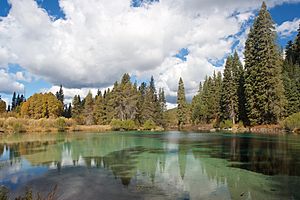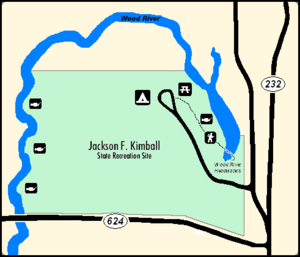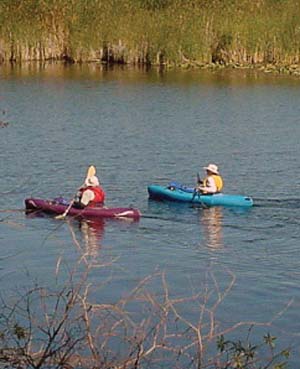Jackson F. Kimball State Recreation Site facts for kids
Quick facts for kids Jackson F. Kimball State Recreation Site |
|
|---|---|

Jackson F. Kimball State Recreation Site, October 2005
|
|
| Lua error in Module:Location_map at line 420: attempt to index field 'wikibase' (a nil value). | |
| Type | Public, state |
| Location | Klamath County, Oregon |
| Nearest city | Klamath Falls |
| Area | 19 acres (7.7 ha) |
| Operated by | Oregon Parks and Recreation Department |
Jackson F. Kimball State Recreation Site is a cool state park in southern Oregon. It's a great place to visit for outdoor fun! The park is managed by the Oregon Parks and Recreation Department. You can find it about 20 miles (32 km) southeast of Crater Lake National Park. It's also about 3 miles (4.8 km) north of Fort Klamath. This park was created in 1955. It covers 19 acres (7.7 ha) and includes the very beginning of the Wood River.
Contents
Fun Things to Do at the Park
At Kimball State Recreation Site, you can enjoy many outdoor activities. Visitors often come here to camp or have a picnic. It's also a popular spot for water fun. You can go fishing, canoeing, and kayaking in the clear waters.
There's a short path that leads from the main camping area. This trail takes you right to where the Wood River begins. The park has ten simple campsites. These are located close to the river's starting point. Keep in mind that the restrooms are basic, and there's no drinking water available.
A popular horse trail starts at Collier Memorial State Park. This trail goes through the forest and ends at Kimball State Recreation Site. Horse riders need to plan a round trip. This is because there are no horse corrals at Kimball Recreation Site.
Discover the Wood River
The Wood River starts right here in Kimball State Recreation Site. Its waters come from a natural spring. Scientists believe this spring is fed by underground water. This water might travel from about 20 miles (32 km) northeast of the park. That area is on the east side of Crater Lake National Park.
The Wood River flows gently for about 10 miles (16 km). It winds through beautiful pine forests and some farm areas. Finally, it empties into Agency Lake. The park itself is filled with tall trees. You'll see ponderosa and lodgepole pines. There are also some pretty quaking aspen trees.
The river is a great place for fishing. You can fish from the shore or from a canoe or kayak. You might catch brook, brown, and rainbow trout. Biologists have also found native Great Basin redband trout here. These special fish live in the river between the park and Annie Creek.
Visiting the Park
The park is located in the Cascade Mountains. This area has cold winters with lots of snow. Summers are usually dry and warm. The park sits at an elevation of about 4,211 feet (1,284 m).
It usually opens in mid-April, if the weather allows. Sometimes, if there's a lot of snow, it might open later, even in June. The park typically closes in October. This is after the busy summer visitor season ends.
You can find Jackson F. Kimball State Recreation Site just off Highway 232. It's about 20 miles (32 km) southeast of Crater Lake National Park. It's also 3 miles (4.8 km) north of Fort Klamath. If you're coming from Klamath Falls, it's about 40 miles (64 km) northwest.
Park History and Naming
In 1943, the State of Oregon bought a large area of land. This was about 14,450 acres (58.5 km2) near Sun Mountain. They wanted to create Sun Pass State Forest. More land was added to the forest in the years that followed.
In 1955, a part of this forest land was given to the Oregon State Highway Division. This 19 acres (7.7 ha) section became Jackson F. Kimball State Park. The park was named after Jackson F. Kimball. He was an important forest warden for the Klamath-Lake Forest Protective Association. In 2004, the park's name was officially changed to Jackson F. Kimball State Recreation Site.
Jackson Kimball was born in Maine around 1874. He started working for the Weyerhaeuser Timber Company in 1905. He was also involved with other timber companies. Kimball was a trustee at the American National Bank of Klamath Falls. He spent time in Salem to talk with the Oregon Legislature. He spoke on behalf of the timber industry. Kimball began working with the Klamath-Lake Counties Forest Fire Association in 1908. He stayed active with this group until he passed away in 1944.
 | Sharif Bey |
 | Hale Woodruff |
 | Richmond Barthé |
 | Purvis Young |



